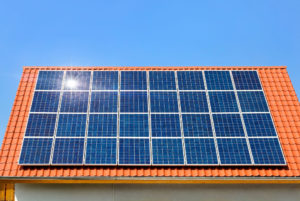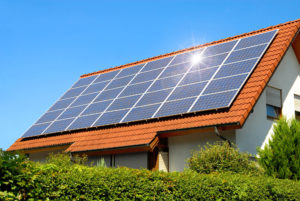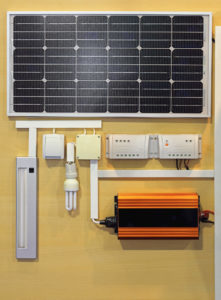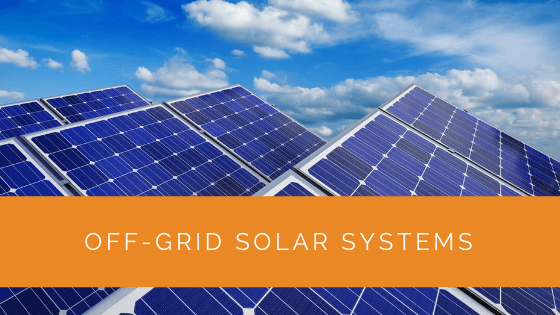If you want to switch to an eco-friendly life, you are not too late. Life off-grid could be your next step in reducing your carbon footprint significantly. Additionally, with the off-grid solar systems, you can avail of a year-long power supply with zero hassles.
Off-grid solar systems are the best options for people residing in remote areas with a shortage of power resources. Such sites are also prone to frequent power cuts and demand access to the grid. Solar energy is an efficient solution to all these power problems with its many benefits.
If you are wondering how to access the off-grid solar system and if it’s worth it, read along!
Contents
- 1 Key Takeaways
- 2 What is a Solar Off-Grid System?
- 3 How Does Off-Grid Solar System Work?
- 4 What Does an Off-Grid Inverter Do?
- 5 Is Opting for an Off-Grid Solar System Worth it?
- 6 What are the Things to Consider Before Building an Off-Grid Solar System?
- 7 Benefits of Opting for Off-Grid Living
- 8 Case Study: Implementing an Off-Grid Solar System in a Remote Farmhouse
- 9 Expert Insights From Our Solar Panel Installers About Off-Grid Solar Systems
- 10 Discover the Power of Solar with Solar Panels Network
- 11 Final Verdict
Key Takeaways
- Off-grid solar systems are eco-friendly for areas with power shortages and frequent outages. These systems consist of batteries, inverters, and solar panels, providing an autonomous power source.
- Off-grid solar systems operate by converting solar radiation into direct current (DC), storing excess power in batteries for cloudy or rainy days, and converting DC to alternate current (AC) for household use.
- Before investing in an off-grid solar system, consider factors like your power needs, location for solar panels, component selection, and the environmental and cost benefits of reduced grid dependency.
What is a Solar Off-Grid System?
Opting for off-the-grid living requires adequate preparation and being self-sufficient. People today are working towards environmental conservation and avoiding any negative impact on Mother Nature.
Though off-grid living may sound complicated, with the advancements in technology today, you can access renewable energy sources seamlessly. This advancement has made off-grid technology worth your investment.
Off-griding, be it total or partial, can be successfully attained with solar power systems. Also known as the PV system, off-girds are an excellent option for people residing in remote areas. Since the off-grid solar system isn’t connected to the primary grid, including batteries is vital for power storage.
An off-grid solar system includes- a battery, inverter, and solar PV panels. These systems are environmentally friendly and help you save tons of money. Since solar energy is unlimited, you can harness it for all your energy needs, from lighting to cooking to heating, without worrying about its depletion.
How Does Off-Grid Solar System Work?
Wondering how these excellent systems of electricity work? Below is the stepwise guide explaining the functioning of an off-grid solar system:
- The off-grid solar systems operate on the principles of photovoltaic. Here, when captured by the solar panels, the solar radiations generate direct current (DC) energy.
- Once the DC is generated, it is passed onto the charge controller and supplied to the battery. It is needed as batteries play a pivotal role when you experience cloudy or rainy days with minimal sunlight exposure.
- The solar panel can offer the highest energy productivity during maximum sunlight and produce enough power for your household needs. The excess power generated is stored in the battery for future needs.
- Later, the DC power is converted to AC or alternate current, which is used for residential purposes.
- The alternate current is then supplied to the loads through a wiring system.
Off-grid solar systems involve major installation processes. It may seem like an easy task if you require them for a small cabin, but large-sized off-grid solar powers for homes and businesses need the guidance of a professional solar installer.

What Does an Off-Grid Inverter Do?
An off-grid solar system works with the help of an inverter that helps convert the DC power into AC. Since the power generated by the AC voltage is higher, it can supply electricity to the entire household.
Inverters are used for operating appliances, such as washing machines, vacuum cleaners, fans, and more. Smaller devices utilise a lot of energy, requiring an efficient inverter. Also, electronic appliances such as computers and laptops would consume less power than others.
If your area has a faulty power supply, the inverters can be equipped with a generator or battery to ensure a non-stop power supply. Inverters have the cardinal work of supplying sine wave AC energy and are the backbone of the off-grid solar system.
Understanding a few details before jumping onto installing an inverter is essential.
Things to Consider Before Selecting an Off-Grid Inverter
Before investing in an off-grid solar system, you may have to analyse a few primary factors for maximum efficiency:
- Types of Appliances: Different appliances consume a varied range of energy. Hence, it would help to consider your target appliances before selecting an inverter that could support them adequately.
- Inverter Rating: For efficient inverter performance, you must consider its rating before installation.
- Consumption of Power: You may have to estimate the total power consumption for each day. It would help to select an inverter that can support a power load accordingly.
- Features: With tons of inverters flooding the market, you can opt for an inverter with advanced features. Few features like cooling fans, remote controls, etc., offer the users premium service.
Is Opting for an Off-Grid Solar System Worth it?
Off-grid solar systems are an excellent option for anyone who wants a cleaner and greener energy supply. Though they have many benefits, it is vital to recognise the downsides of these systems, too.
Pros
- Suitable for remote areas where the supply of electricity is a challenge
- Reduce dependency on the grid
- Storable energy for future needs
Cons
- Complicated installation process
- Restricted backup time
- Slightly pricey in its initial stage
What are the Things to Consider Before Building an Off-Grid Solar System?
Installing an off-grid solar system is not very complex. However, a few things to consider before installing one for your house. These are:
Step 1: Identify Your Power Needs
 Before opting for off-grid power, note your household or commercial power needs. You may even have to consider the change in your energy needs throughout the day or year.
Before opting for off-grid power, note your household or commercial power needs. You may even have to consider the change in your energy needs throughout the day or year.
Additionally, you must consider the number of appliances you power using the solar system to help you recognise your power needs. This, in turn, would help you invest in an efficient off-grid solar system that would take care of all your power needs.
Step 2: Choose the Right Location
Your next step before setting up an off-grid solar system should be choosing an appropriate location. For example, the roof of your house may not be the best option for an off-grid solar array. You may have to consider areas that have minimal shading.
A place that receives maximum sunlight and helps cool your solar panels will be an excellent option for setting up an off-grid system. It would help improve the system’s efficiency and provide an uninterrupted power supply.
Step 3: Solar System Components
Once you are done choosing a location for your solar system components, you can move towards selecting the components for your off-grid system. Below are a few details you may have to consider while installing your system:
- Size and number of solar cells needed
- Battery capacity
- Battery type
- Inverter rating
Step 4: Installing Solar Panels
Lastly, you have to get your solar panels in a place that will let you capture sunlight to produce power. The tricky part of installing solar panels is the place you select for them. Solar panels work well if placed directly under the sun.
Also, it is recommended to get the assistance of a professional before installing the solar panels.
Benefits of Opting for Off-Grid Living
So, why should you opt for off-grid living? Even though installing and investing in an off-grid solar system seems like a challenging task, it has innumerable benefits:
It Is Eco-Friendly
Opting for an off-grid life will let you live an eco-friendly life and help reduce carbon emissions. Additionally, with an efficient off-the-grid solar system, you can significantly reduce your consumption of non-renewable sources like coal, oil, etc. It would reduce your grid supply dependency and make you environmentally conscious.
It Is Cost-Reducing
We are all aware of our monthly electricity bills, which are generally very hefty. Whether for residential or commercial, the yearly electricity can take a toll on savings. Here is where off-grid systems can help you.
Even though setting up an off-grid solar system will initially cost you a bit, it will save you a notable amount in the long run. Opting for an off-grid solar system will let you enjoy a year-long unlimited electricity supply free of cost.

Lowers Dependency on Grid
By selecting off-grid living, you can be free from the national electricity supply and directly harness energy from the environment. Even in a remote area, you will need not worry about the power supply once you invest in off-grid solar systems.
Case Study: Implementing an Off-Grid Solar System in a Remote Farmhouse
Background
Solar Panels Network was approached by a family who owned a farmhouse in a remote area of Scotland. The location had limited access to the national electricity grid, and the family wanted to switch to an off-grid solar system to ensure a consistent and eco-friendly power supply. The farm’s energy needs included lighting, heating, and powering various agricultural equipment.
Project Overview
The primary goals were to achieve energy independence, reduce the carbon footprint, and cut down on the high costs associated with fuel-powered generators. Our team conducted a comprehensive energy audit to determine the farmhouse’s daily and seasonal energy consumption patterns.
Implementation
- Energy Needs Assessment: The audit revealed that the farmhouse required approximately 10 kWh of electricity daily, with peak usage during the winter months due to heating needs. The solar panel system was designed to meet these requirements, with a buffer for storage during less sunny periods.
- System Design and Component Selection: We recommended a robust off-grid solar system comprising:
- Solar Panels: A total of 28 monocrystalline solar panels were selected for their high efficiency and durability, providing a combined output of 8 kW.
- Inverters and Controllers: A high-capacity inverter was installed to convert the DC power generated by the panels into AC power usable by the household. Additionally, a charge controller was included to manage the battery charging process and prevent overcharging.
- Battery Storage: The system included a set of lithium-ion batteries with a total storage capacity of 50 kWh, ensuring an adequate power reserve for several days of cloudy weather.
- Installation and Configuration: The solar panels were strategically placed on the farmhouse roof, oriented to maximize sunlight exposure throughout the year. The installation process was handled by our professional team, ensuring all components were securely mounted and properly wired.
- Performance Monitoring and Optimization: After installation, the system was monitored to ensure optimal performance. The setup included remote monitoring capabilities, allowing the family to track energy production and consumption in real-time. Adjustments were made to the inverter settings to optimize energy use and storage.
Results
- Energy Independence and Cost Savings: The off-grid solar system successfully met the farmhouse’s energy needs, eliminating the reliance on fuel-powered generators. The family experienced a significant reduction in operating costs, as they no longer needed to purchase fuel for generators. The initial investment was projected to be recovered within 5-7 years through savings on energy costs.
- Environmental Impact: The shift to solar power significantly reduced the farmhouse’s carbon footprint, contributing to the family’s goal of living a more sustainable lifestyle. The use of clean, renewable energy also aligned with their commitment to environmental conservation.
- System Reliability and Maintenance: The solar system proved reliable, with the battery storage providing ample power during periods of low sunlight. Regular maintenance, including cleaning the panels and checking the battery health, ensured the system’s longevity and consistent performance.
Summary
This case study demonstrates the practical and environmental benefits of off-grid solar systems for properties in remote locations. The successful implementation at the farmhouse highlighted the importance of accurate energy assessment, appropriate component selection, and professional installation. At Solar Panels Network, we continue to support our clients in making sustainable energy choices that align with their needs and values.
Expert Insights From Our Solar Panel Installers About Off-Grid Solar Systems
Off-grid solar systems are ideal for remote locations where access to traditional power grids is limited or non-existent. They provide a sustainable, independent power source that can cater to all household and commercial needs.
Senior Solar Engineer
Investing in off-grid solar systems can be cost-effective in the long run, despite the initial setup costs. The key is to assess your energy requirements accurately and choose the right components, including solar panels, batteries, and inverters, to ensure a reliable power supply.
Solar Energy Consultant
Proper installation and maintenance of off-grid solar systems are crucial for their efficiency and longevity. It’s advisable to seek professional assistance to optimize the system’s placement and configuration, ensuring maximum energy capture and storage.
Renewable Energy Specialist
Discover the Power of Solar with Solar Panels Network
Are you navigating the world of solar installations? Look no further than Solar Panels Network, the UK’s trusted partner in harnessing the sun’s potential. Our dedication goes beyond just installations; we’re on a mission to transform how homeowners and businesses across the UK perceive and utilise energy. By choosing us, you’re reducing your carbon footprint and making a smart financial move that promises savings for years ahead. Contact us today and embark on your solar journey.
Final Verdict
Working out a plan for going off-grid can be daunting and confusing. Hence, it is crucial to understand how these systems work and where you can install them for maximum benefits.
A considerable portion of the population in rural areas in the UK resides in off-grid homes. This signifies a noteworthy shift in people’s preferences towards cleaner energy sources.
Thus, even though opting for an off-solar system may seem challenging initially, you can relish an inexhaustible electricity supply with zero dependency on the grid throughout your life!
About the Author
Solar Panels Network stands at the forefront of solar energy solutions, driven by a team of seasoned solar engineers and energy consultants. With over decades of experience in delivering high-quality solar installations and maintenance, we are committed to promoting sustainable energy through customer-centric, tailored solutions. Our articles reflect this commitment, crafted collaboratively by experts to provide accurate, up-to-date insights into solar technology, ensuring our readers are well-informed and empowered in their solar energy decisions.

